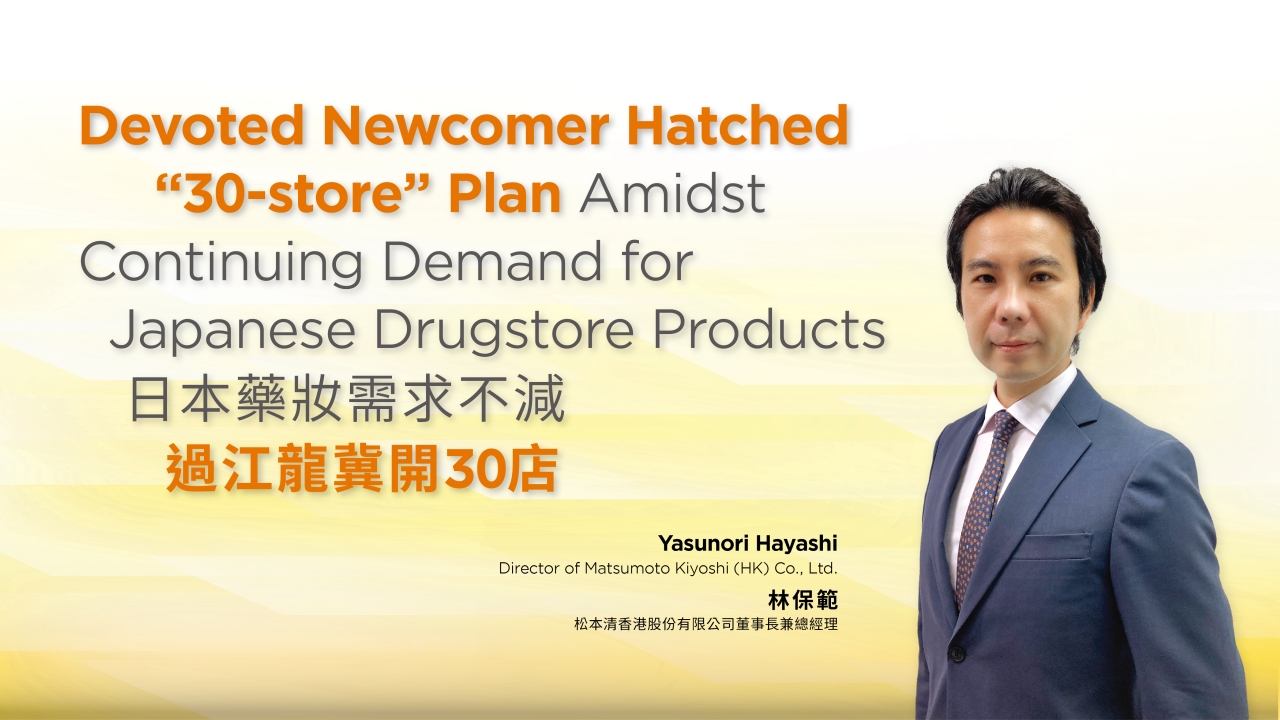
Newcomer Hatched "30-store" Plan Amidst Continuing Demand for Japanese Drugstore Products
The Japan Tourism Agency reported about 910,000 Hong Kong travellers visited Japan in the first half of 2023, placing behind Taiwan, Korea and the US, and ranked the 5th biggest foreign spender with HK$91.6 billion spending*. Has the opening of borders affect the sales of Japanese and Korean products locally, which prospered during COVID?
Yasunori Hayashi, Director of Matsumoto Kiyoshi (HK) Co., Ltd., said the company has experienced steady revenue growth despite relaxed travel restrictions for HK people, driven by its product diversification strategy which highlights more than 16,000 different products offering, from cosmetics and health foods to everyday grocery. Planning to expand in HK and Macau markets, Matsumoto Kiyoshi (MK) is broadening its product range with more daily essentials and food products, aiming to make the company the first choice for those who admire Japanese culture and products.
Holistic Supermarket-like Health & Beauty Shop
Premiered in May 2022 amid the raging pandemic in Hong Kong, MK has opened 6 stores within just more than a year. The company aspired to open 30 stores within 5 years, and adapt the size of the shop according to the specific locale. "Half of our stores are located in high-traffic areas like Causeway Bay and Tsim Sha Tsui, for better brand visibility, and another half in residential areas, where we offer a wider range of products like pet supplies and contact lenses, catering to the everyday needs of the residents and creating a one-stop shopping experience.”
One of the local store holds a top 5 position in sales among the company's expansive network of over 3,400 stores throughout Asia, thanks to the popularity of their in-house health products and exclusive co-branded items. "About 10% of our product line-up, or some 1,600 items, are from our own brand. Domestic consumers are also flocking to exclusive co-branded products, such as the limited edition Doraemon ANESSA sunscreen lotion, which accounts for half of the overall sales in the group. These items not only draw traffic to our stores, but also promote more spending.”


Daily Lucky Draw Gimmick for the 7th Store in Sep
Set to open the 7th branch by end September in Mongkok, MK plans to roll out a membership scheme and a dedicated mobile app. Among the initial promotional activities is a daily "Lucky Wheel" coupon draw, an initiative expected to stimulate consumption. "In Japan, we use proximity-based push notifications extensively. Let’s say the weather near Ginza is hot and humid, we would send out discount messages for items like tissues or drinks to lure customers. Instead of using demographic data like age or gender, we aim for personalised promotions that are based on individual customer's buying history. It is expected to roll out in Hong Kong as well to engage our customers." Technology-driven, an AI makeup smart mirror called “KATE BOX” is set-up in its Causeway Bay store that use customer's facial features and clothing style on the day to suggest the most fitting makeup.


Mr. Hayashi is keenly aware of the values of EDI (Electronic Data Interchange) as well, which is why the company adopted GS1 HK's "ezTRADE" platform since its inception in Hong Kong, and demanded its suppliers to use.
“I’m pleased to know that many local agents for Japanese brands have been using "ezTRADE" for transactions with retailers, with proven positive results for years. As a leading Japanese drugstore, it comes naturally for us to adopt the established industry standard. The platform is critical to enhance our procurement and auditing efficiencies, ensuring data accuracy, and allowing us go paperless, paving way to a small yet important step towards environment protection and our sustainable development.”
While 80% of the group's products are shipped directly from Japan to Hong Kong, the other 20%, such as Kao and LION brands, are supplied via local agents at present.

Subtle Difference of HK, TW, JP Shoppers
Also serving as the chief of Matsumoto Kiyoshi in Taiwan, Mr. Hayashi thinks while the consumption patterns in Hong Kong, Taiwan and Japan are similar, he noticed there are subtle differences, like the quality-seeking Hong Kong’s customers usually spend more per bill, as opposed to Japanese’ supermarket-style shopping, and Taiwanese treating the purchase as a reward to oneself or others when one feels weary.
“Today's Gen Z customers tend to compare products online, make their own choices, and check out quickly. They rarely ask for help from staff, so we're considering introducing self-checkout counters to make shopping more convenient. Once our growth turns stable, we'll even consider the possibility of unmanned stores with fully automated shopping models.”
Mr. Hayashi maintains a positive outlook on the potentials of AI, which is expected to support the front-end services in the future. He imagined AI could assist in diagnostics, providing essential data to pharmacists and nutritionists to recommend the most fitting treatment or wellness plans for customers, or aid in backend tasks such as stock replenishment. When asked about the company’s e-com plan, he noted that given Hong Kong's dense population, close proximity of stores and the convenience these offer mean MK will focus on brick-and-mortar stores. He expressed concern over the quality of the many online marketplaces where products of unknown source or inferior quality, so he urged consumers to shop through legitimate channels.

Challenges & Sustainable Development
Hong Kong has stringent requirements for imported drugs, which is why many over-the-counter (OTC) drugs from MK are still awaiting approval for distribution. Mr. Hayashi is hopeful that this process can be accelerated in the future to better cater to local needs. The group is also grappling with challenges posed by labor shortages and warehouse management, yet he believes digitalisation and automation will clear the way ahead for the retail industry.
Committed to “Net Zero” by 2050, the Group has done more than reducing paper usage via digital ways by "ezTRADE", they have also used automatic timing controls for the LED wall at the Causeway Bay flagship store and the lighting system at the Tsim Sha Tsui Kimberly Road store. This helps minimize disturbances to the neighbourhood and also monitor power usage.
“About 40% of Matsukiyo's own brand products are made in an eco-friendly way. For example, the eco-bags sold in Japan are crafted from 4 recycled materials. Our another brand ARGELAN, the products are produced in 95% natural materials. Besides, our headquarter has made flexible and work-from-home arrangements one of our human resource policies for a few years, and we are now enforcing these measures in the oversea branches to foster a carbon-reducing culture and play our part to protect the environment”
* Japan Tourism Statistics (Jul 2023). “Visitor Arrivals to Japan and Japanese Overseas Travelers”. https://statistics.jnto.go.jp/en/graph/

